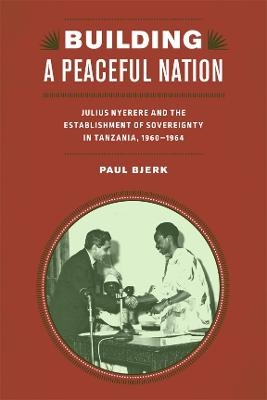
Building a Peaceful Nation
Julius Nyerere and the Establishment of Sovereignty in Tanzania, 1960-1964
Seiten
2015
University of Rochester Press (Verlag)
978-1-58046-505-2 (ISBN)
University of Rochester Press (Verlag)
978-1-58046-505-2 (ISBN)
A compelling account of the establishment of Tanzania's stable and ambitious government in the face of external threats and internal turmoil.
In the early 1960s, nationalist politicians established in Tanzania a stable government in the face of external threats and internal turmoil. Paul Bjerk's volume chronicles this history and examines the politics and policies of the nation's first president, Julius Nyerere. One of the great leaders of modern Africa, Nyerere unified the diverse people who became citizens of the new nation and negotiated the tumultuous politics of the Cold War. In an era whenmany postcolonial countries succumbed to corrupt dictatorship or civil war, Nyerere sought principled government. Making difficult choices between democratic and autocratic rule, Nyerere creatively managed the destabilizing forces of decolonization.
With extensive archival research and interviews with scores of participants in this history, Bjerk reorients our understanding of the formative years of Tanzanian independence. This study provides a new paradigm for understanding the history of the postcolonial nations that became independent in a global postwar order defined by sovereignty.
Paul Bjerk is associate professor of history at Texas Tech University.
In the early 1960s, nationalist politicians established in Tanzania a stable government in the face of external threats and internal turmoil. Paul Bjerk's volume chronicles this history and examines the politics and policies of the nation's first president, Julius Nyerere. One of the great leaders of modern Africa, Nyerere unified the diverse people who became citizens of the new nation and negotiated the tumultuous politics of the Cold War. In an era whenmany postcolonial countries succumbed to corrupt dictatorship or civil war, Nyerere sought principled government. Making difficult choices between democratic and autocratic rule, Nyerere creatively managed the destabilizing forces of decolonization.
With extensive archival research and interviews with scores of participants in this history, Bjerk reorients our understanding of the formative years of Tanzanian independence. This study provides a new paradigm for understanding the history of the postcolonial nations that became independent in a global postwar order defined by sovereignty.
Paul Bjerk is associate professor of history at Texas Tech University.
Introduction
The Education of Julius Nyerere
Contemplating the Postcolony
Independence and the Fear of Division
The Invention of Ujamaa
The Origins of Villagization
The 1964 Army Mutiny
The National Youth Service
A Realist Foreign Policy
The Cold War and the Union Treaty
Contending with International Intrigue
Conclusion
Notes
Bibliography
Index
| Erscheint lt. Verlag | 15.2.2015 |
|---|---|
| Reihe/Serie | Rochester Studies in African History and the Diaspora |
| Verlagsort | Rochester |
| Sprache | englisch |
| Maße | 152 x 229 mm |
| Gewicht | 1 g |
| Themenwelt | Kinder- / Jugendbuch ► Sachbücher ► Kunst / Musik |
| Geschichte ► Allgemeine Geschichte ► Zeitgeschichte | |
| Geisteswissenschaften ► Geschichte ► Regional- / Ländergeschichte | |
| ISBN-10 | 1-58046-505-6 / 1580465056 |
| ISBN-13 | 978-1-58046-505-2 / 9781580465052 |
| Zustand | Neuware |
| Haben Sie eine Frage zum Produkt? |
Mehr entdecken
aus dem Bereich
aus dem Bereich
Gewalt, Umwelt, Identität, Methode
Buch | Softcover (2024)
Spector Books OHG (Verlag)
36,00 €
der Osten, der Westen, der Zorn und das Glück
Buch | Hardcover (2024)
S. Fischer (Verlag)
26,00 €


